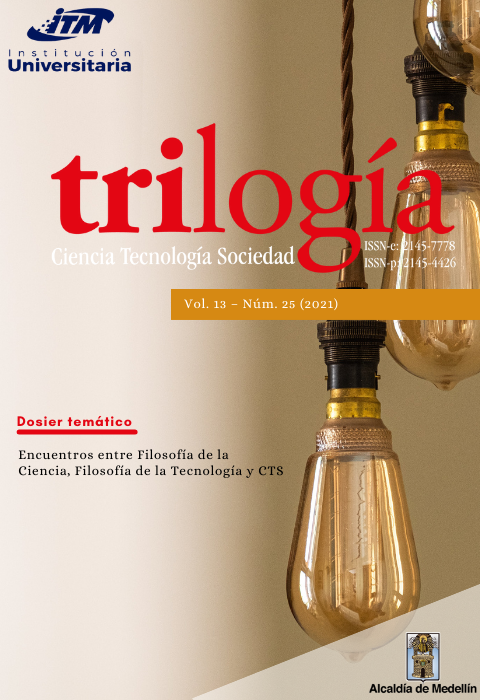From Ages to Landscapes. A Critical Perspective on the "Age of the Atom": Encounters between STS and Philosophy of Technology
Abstract
STS studies have sought to make science look at everything going on in a field of study and not limit itself to theory, as evidenced by what is called the "empirical turn" in the philosophy of technology. This study shows the possible link between the philosophy of technology and the STS perspective, proposing the concept of time-landscape as more appropriate than that of chronological time to understand current technological changes. In this sense, beyond the theoretical conjectures about technology, this research takes nuclear energy as a case study to question and weigh the traditional assumptions of technical change, adopting the methodological principle of the requirement of concreteness of empirical studies and the concept of socio-technical imaginary. The inquiry process combined elements such as epistemology, ethics and politics in an anthropological perspective. Finally, it is argued that the use of nuclear energy, considered as part of the age of the atom, opens the possibility of thinking about time in terms other than chronological. The study also helps to illustrate the mutual benefits of a partnership between STS studies and philosophy of technology.
References
Adam, B. (1998). Timescapes of Modernity: The Environment and Invisible Hazards. Routledge.
Announcing the Bombing of Hiroshima. (1945, 6 de agosto). American Experience. https://www.pbs.org/wgbh/americanexperience/features/truman-hiroshima/
Austin, J. L. (1962). How to Do Things with Words. Clarendon Press.
Badash, L. (2009). A Nuclear Winter's Tale: Science and Politics in the 1980s. The MIT Press.
Baschet, J. (2018). Défaire la tyrannie du présent. Temporalités émergentes et futurs inédits. La Découverte.
Bensaude-Vincent, B. (2021). Temps-paysage: Pour une écologie des crises. Éditions Le Pommier.
Bijker, W. E.; Hughes, T. P.; Pinch, T. (eds.). (1987). The Social Construction of Technological Systems: New Directions in the Sociology and History of Technology. The MIT Press.
Bonneuil, C.; Fressoz, J. B. (2012). L’événement Anthropocène. La terre, l’histoire et nous. Seuil.
Bouton, C.; Huneman, P. (eds.). (2017). Time of Nature and the Nature of Time. Philosophical Perspectives of Time in Natural Sciences. Springer. https://doi.org/10.1007/978-3-319-53725-2
Brey, P. (2010). Philosophy of Technology after the Empirical Turn. Techné: Research in Philosophy and Technology, v. 14, n. 1, 36-48. https://doi.org/10.5840/techne20101416
Camus, A. (1945, 08 de Agosto). Éditorial. Combat.
Chakrabarty, D. (2009). The Climate of History: Four Theses. Critical Inquiry, v. 35, n. 2, 197-222. https://doi.org/10.1086/596640
Charbonneau, B. (2014). An deux mille. En B. Charbonneau; J. Ellul, Nous sommes des révolutionnaires malgré nous (pp. 193-215). Seuil.
Conty, A. (2016). Who is to Interpret the Anthropocene? Nature and Culture in the Academy. La Deleuziana, n. 4, 19-44.
Crutzen, P. J.; Birks, J. (1982). The Atmosphere after a Nuclear War: Twilight at Noon. Ambio, v. 11, n. 2/3, 114-125.
Crutzen, P. J.; Stoermer, E. F. (2000). The “Anthropocene”. Global Change Newsletter, n. 41, 17-18.
Danowski, D.; Viveiros de Castro, E. (2016). The Ends of the World. Polity.
Daston, L.; Galison, P. (2007). Objectivity. Zone Books.
Deleuze, G.; Guattari, F. (1980). Mille Plateaux. Capitalisme et schrizophrnie. Les Éditions de Minuit.
Descartes, R. (1637). Discours de la méthode. Leyde.
Descola, P. (2018a). Humain, trop humain. En R. Beau; C. Larrère. (dirs.). Penser l’Anthropocène (pp. 19-35). Presses de Science Po.
Descola, P. (2018b). Is the Anthropocene soluble in ontological pluralism? https://www.anthropocene-curriculum.org/contribution/anthropocene-lecture-philippe-descola
Dörries, M. (2011). The Politics of Atmospheric Sciences: “Nuclear Winter” and Global Climate Change. Osiris, v. 26, n. 1, 198-223. https://doi.org/10.1086/661272
Edgerton, D. (2007). The Shock of the Old. Technology and Global History Since 1900. Oxford University Press.
Feenberg, A. (2000). From Essentialism to Constructivism: Philosophy of Technology at the Crossroads. En E. Higgs; A. Light; D. Strong (eds.), Technology and the Good Life? (pp. 294-315). University of Chicago Press.
Feenberg, A. (2003). Modernity Theory and Technology Studies: Reflections on Bridging the Gap. En T. J. Misa; P. Brey; A. Feenberg (eds.), Modernity and Technology (pp. 73-104). The MIT Press.
Foucault, M. (1966). Les mots et les choses. Une archéologie des scienes humaines. Éditions Gallimard.
Fressoz, J. B. (2014). Pour une histoire désorientée de l’énergie. En 25èmes Journées scientifiques de l’environnement. https://hal.archives-ouvertes.fr/hal-00956441/document
Hacking, I. (1983). Representing and Intervening. Introductory Topics in the Philosophy of Natural Science. Cambridge University Press.
Haraway, D. J. (2007). When Species Meet. University of Minnesota Press.
Hård, M.; Jamison, A. (eds.). (1998). The Intellectual Appropriation of Technology: Discourses on Modernity, 1900-1939. The MIT Press.
Hård, M.; Jamison, A. (2005). Hubris and Hybrids. A Cultural History of Technology and Science. Routledge.
Harman, G. (2010). L'objet quadruple : Une métaphysique des choses après Heidegger. Presses Universitaires de France.
Hartog, F. (2015). Régimes d'historicité. Présentisme et expériences du temps. Points.
Hooft, G.; Vandoren, S. (2014). Time in Powers of Ten. World Scientific Publishing. https://doi.org/10.1142/8786
International Geophere-Biosphere Programme. (2015). Great Acceleration. http://www.igbp.net/globalchange/greatacceleration.4.1b8ae20512db692f2a680001630.html
Jasanoff, S.; Kim, S. H. (eds.). (2015). Dreamscapes of Modernity: Sociotechnical Imaginaries and the Fabrication of Power. University of Chicago Press.
Kant, I. (1784). Idées d’une histoire universelle au point de vue cosmopolitique. Bordas.
Knowles, S. G. (2014). Learning from Disaster? The History of Technology and the Future of Disaster Research. Technology and Culture, v. 55, n. 4, 773-784. https://doi.org/10.1353/tech.2014.0110
Kuchinskaya, O. (2014). The Politics of Invisibility: Public Knowledge about Radiation Health Effects after Chernobyl. The MIT press.
Lakoff, G.; Johnson, M. (1980). Metaphors We Live by. University of Chicago Press.
Latour, B. (1987). Science in Action: How to Follow Scientists and Engineers through Society. Harvard University Press.
Latour, B. (1991). Nous n’avons jamais été modernes. Éditions La Découverte.
Latour, B. (1999). Politiques de la nature. Comment faire entrer les sciences en démocratie. Éditions La Découverte.
Latour, B. (2014). Agency at the Time of the Anthropocene. New Literary History, v. 45, n. 1, 1-18. https://doi.org/10.1353/nlh.2014.0003
Latour, B. (2017). Facing Gaia. Eight Lectures on the New Climatic Regime. Polity.
Lewis, S. L.; Maslin, M. A. (2015). Defining the Anthropocene. Nature, v. 519, 171-180. https://doi.org/10.1038/nature14258
Linnér, B. O.; Wibeck, V. (2015). Dual high-stake emerging technologies: A review of the climate engineering research literature. WIREs Climate Change, v. 6, n. 2, 255-268. https://doi.org/10.1002/wcc.333
Loeve, S.; Guchet, X.; Bensaude-Vincent, B. (eds). (2018). French Philosophy of Technology: Classical Readings and Contemporary Approaches. Springer.
Meillassoux, Q. (2006). Après la finitude. Essai sur la nécessité de la contingence. Éditions du Seuil.
Mol, A. (2002). The Body Multiple: Ontology in Medical Practice. Duke University Press.
Monastersky, R. (2015). Anthropocene. The Human Age. Nature, v. 519, 144-147. https://doi.org/10.1038/519144a
Moore, J. W. (ed.). (2016). Anthropocene or Capitalocene? Nature, History, and the Crisis of Capitalism. PM Press.
Mumford, L. (1946). Gentlemen: You are mad! The Saturday Review of Literature, v. 29, n. 2, 5-6.
Nixon, R. (2013). Slow Violence and the Environmentalism of the Poor. Harvard University Press.
Pinault, M. (2000). Frédéric Joliot-Curie. Odile Jacob.
Pinch, T. J.; Bijker, W. E. (1984). The Social Construction of Facts and Artefacts: Or How the Sociology of Science and the Sociology of Technology might Benefit Each Other. Social Studies of Science, v. 14, n. 3, 399-441. https://doi.org/10.1177/030631284014003004
Sartre, J. P. (1945). Présentation. Les Temps Modernes, n. 1.
Serres, M. (1980). Le passage du Nord-Ouest. Les Éditions de Minuit.
Serres, M. (1990). Le contrat naturel. Éditions François Bourin.
Serres, M. (1994). Atlas. Julliard.
Serres, M. (2019). Relire le relié. Éditions Le Pommier.
Singer, P. (2012). La libération animale. Payot.
Srinivasan, K.; Kasturirangan, R. (2016). Political ecology, development and human exceptionalism. Geoforum, v. 75, 125-128. https://doi.org/10.1016/j.geoforum.2016.07.011
Steffen, W.; Broadgate, W.; Deutsch, L.; Gaffney, O.; Ludwig, C. (2015). The trajectory of the Anthropocene: The Great Acceleration. The Anthropocene Review, v. 2, n. 1, 81-98. https://doi.org/10.1177/2053019614564785
Tsing, A. L. (2015). The Mushroom at the End of the World. On the Possibility of Life in Capitalist Ruins. Princeton University Press.
Topçu, S. (2013). La France nucléaire. L’art de gouverner une technologie contestée. Seuil.
Truong, N. (2020, 4 de agosto). Le tournant écopolitique de la pensée française. Le Monde. https://www.lemonde.fr/idees/article/2020/08/02/le-tournant-ecopolitique-de-la-pensee-francaise_6047969_3232.html
Verbeek, P. P. (2005). What Things Do: Philosophical Reflections on Technology, Agency, and Design. Penn State University Press.
Verbeek, P. P. (2008). Obstetric Ultrasound and the Technological Mediation of Morality: A Postphenomenological Analysis. Human Studies, v. 31, n. 1, 11-26. https://doi.org/10.1007/s10746-007-9079-0
Weart, S. (1992). From the Nuclear Frying Pan into the Global Fire. Bulletin of the Atomic Scientists, v. 48, n. 5, 18-27. https://doi.org/10.1080/00963402.1992.11456271
Zwigenberg, R. (2015). Never Again: Hiroshima, Auschwitz and the Politics of Commemoration. The Asia-Pacific Journal, v. 13, n. 3, 1-22. https://apjjf.org/-Ran-Zwigenberg/4252/article.pdf
Downloads
Copyright (c) 2021 Instituto Tecnológico Metropolitano

This work is licensed under a Creative Commons Attribution-NonCommercial-ShareAlike 4.0 International License.










